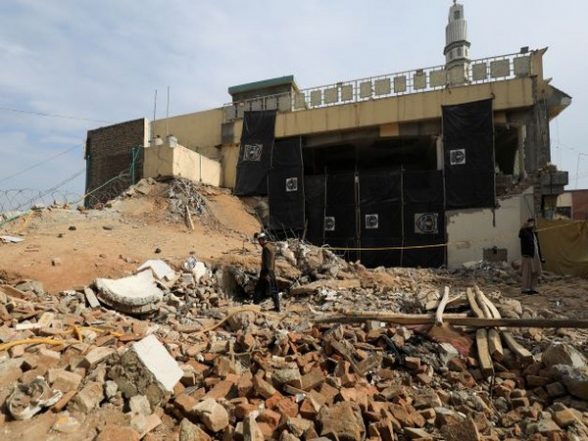[ad_1]
Islamabad [Pakistan]6 March (ANI): Hussein Haqqani, senior fellow and director of South and Central Asia at the Hudson Institute, wrote in Foreign Policy that Pakistan’s economic problems are intertwined with its inconsistent treatment of terrorists.
For decades, Pakistan has allowed some terrorist groups to operate freely while cracking down on others. Foreign sanctions resulting from terrorism and terrorism financing have made it difficult for Pakistan to attract investment.
Read also | Georgia shooting: Two dead, six wounded in shooting at Douglas County house party.
In addition, public, law enforcement, and intelligence sympathy for jihadists, as well as inaction by members of the political class, have allowed domestic terrorist groups to go unpunished, Foreign Policy reported.
Islamist and sectarian groups first launched attacks inside Pakistan in the early 1990s after the Soviet-Afghan War. After the successful expulsion of the Soviets by the Afghan mujahideen – with US support – Pakistan’s security services mobilized similar ideologically motivated groups to try to force India out of Kashmir. After the fall of the Soviet-backed regime from 1992 to 1996, Pakistani jihadists participated in the Afghan civil war and later fought alongside the Taliban from 2001. (Pakistan supported the Taliban regime in Afghanistan in the 1990s).
Read also | Toshakhna case: Imran Khan evades arrest after police show up at Zaman Park residence in Lahore.
Haqqani said Islamabad must change tack if it hopes to prevent a full-blown insurgency and restore its global stature.
Islamist groups recruiting in Pakistan have cited hadith – traditions and sayings attributed to the Prophet Muhammad – that predicted a major war in the Indian subcontinent.
Pakistani security services expect radicalization through religion to help break the impasse over Kashmir and strengthen Pakistan’s allies in Afghanistan. Haqqani said the strategy had instead turned Pakistan into a battleground for competing radical Islamist ideologies.
Over the past 30 years, Pakistan has supported some jihadist groups and tolerated others, while also participating in the US-led war on terror.
Such juggling has weakened Pakistan’s international standing and led some jihadist factions to target Pakistan’s military and security forces, prompting occasional reprisals.
A case in point was the January 30 suicide bombing at a mosque in Peshawar, which killed 101 worshipers, most of them police officers.
Meanwhile, Pakistan is facing violence from the Pakistani Taliban Movement (TTP), an affiliate of the Afghan Taliban movement that is ideologically aligned with the Afghan branch but whose leaders hail from Pakistan, Foreign Policy reported. territory.
The TTP has claimed responsibility for a string of recent terrorist attacks in Pakistan; a TTP splinter group says it carried out the January mosque attack. The group seeks to overthrow the Pakistani government and create an Islamic emirate.
Pakistan’s security services and some politicians, including former prime minister Imran Khan, advocate a nuanced approach to the TTP and other terrorist groups, suggesting that the groups reflect Islamic aspirations and need not be seen as harmful to Pakistan.
But events have repeatedly proved that compromise with armed and violent radical Islamist groups is impossible, Haqqani said.
Years of contradictory policies have crippled Pakistan’s ability to meet challenges from Islamist militants.
Since 2000, more than 8,000 members of Pakistan’s security forces have been killed in terrorist incidents. In 2014, the TTP attacked the Peshawar Army Public School, killing 141 people, including 132 children of officers and soldiers.
The attack on 30 January targeted the police. Both attacks appeared to be aimed at demoralizing the Pakistani military and law enforcement and dissuading Pakistani leaders from going to war with the TTP, Foreign Policy reported.
At the same time, domestic terrorism has adversely affected the country’s economy, which is now in deep crisis. Pakistan’s Ministry of Finance estimates that the country has lost $123 billion in direct and indirect costs to terrorism.
Many foreigners no longer want to travel to Pakistan, which directly affects tourism and exports. Pakistan’s large presence on the Afghanistan-Afghan border, occasional military and intelligence operations have added to the defense budget.
A drop in foreign direct investment and foreign sanctions targeting terrorism financing and money laundering have also taken a toll on the economy, Haqqani said. (Arnie)
(This is an unedited and auto-generated story from a Syndicated News feed, the body of content may not have been modified or edited by LatestLY staff)
share now
[ad_2]
Source link



